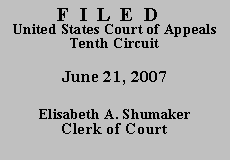

| UNITED STATES OF AMERICA, |
|
| v. | |
| DUNDEE REO BROWN, | |
On appeal, Brown pro se seeks to have his sentence either reduced or expunged based on two grounds. First, he argues that his five-year state parole and three-year federal probation are running concurrently so his federal and state sentences should run concurrently as well. Second, Brown contends that his federal sentence should be expunged because he claims notice of the federal warrant for his arrest in the present crime was provided to his state parole board. Brown suggests his parole was deferred one year based on the warrant so that he was punished for the present federal crime by the state parole hearing. He argues the federal warrant should not have been a consideration in his state parole hearing as he is innocent until proven guilty.(2)
We review sentences imposed post-Booker for reasonableness. United States v. Kristl, 437 F.3d 1050, 1053 (10th Cir. 2006). "[A] sentence that is
properly calculated under the [United States Sentencing] Guidelines [USSG] is entitled to a rebuttable presumption of reasonableness." Id. at 1054. "The defendant may rebut this presumption by demonstrating that the sentence is unreasonable in light of the other sentencing factors laid out in [18 U.S.C.] § 3553(a)." Id. at 1055.
Brown does not dispute that his sentence was properly calculated under the USSG. He was sentenced within the range set out by the Guidelines, so his sentence is presumptively reasonable. And even absent the presumption, the sentence of one year and a day is reasonable.
The district court was also well within its discretion to sentence Brown consecutively rather than concurrently. United States v. Rodriguez-Quintanilla, 442 F.3d 1254, 1256 (10th Cir. 2006). The district court reviewed the pre-sentence report, listened to Brown's request for a concurrent rather than consecutive sentence, and considered the factors set forth in § 3553(a) before setting forth what it considered a reasonable sentence. The district court then sentenced Brown to one day beyond one year so he could be eligible for good-time credits and earlier release. Brown offers no logic or legal support for his contention that the imprisonment period must also run concurrent to his state conviction simply because his federal probation runs concurrent with his state parole.
As for his contention that the state parole board deferred Brown's parole one year based upon the federal warrant in the present case, the present appeal of his federal conviction is not the appropriate forum to seek a remedy. Brown must seek relief with the state parole board itself, engaging in its administrative and appellate procedures to air his grievance regarding state parole board decisions.
After a careful review of the record, we GRANT counsel's request to withdraw and AFFIRM the sentence.
Entered for the Court
Timothy M. Tymkovich
Circuit Judge
*. This order and judgment is not binding precedent except under the doctrines of law of the case, res judicata and collateral estoppel. It may be cited, however, for its persuasive value consistent with Fed. R. App. P. 32.1 and 10th Cir. R. 32.1.
2. After examining the briefs and the appellate record, this three-judge panel has determined unanimously that oral argument would not be of material assistance in the determination of this appeal. See Fed. R. App. P. 34(a); 10th Cir. R. 34.1(G). The cause is therefore ordered submitted without oral argument.
1. Anders v. California, 386 U.S. 738 (1967).
2. Brown suggests a third argument. He argues that he was transported to federal custody pending the resolution of the passport violation charged in this case and should receive credit on his federal sentence for that time. But it appears this claim is part and parcel of the first. If we find the district court judgment of a consecutive sentence was appropriate, Brown's time in federal custody applied only against his state court sentence; therefore, we do not have discretion to give Brown credit for it against his federal sentence. If he is arguing for good time credit from the Bureau of Prisons, it is in its discretion and not ours to award Brown any credit.